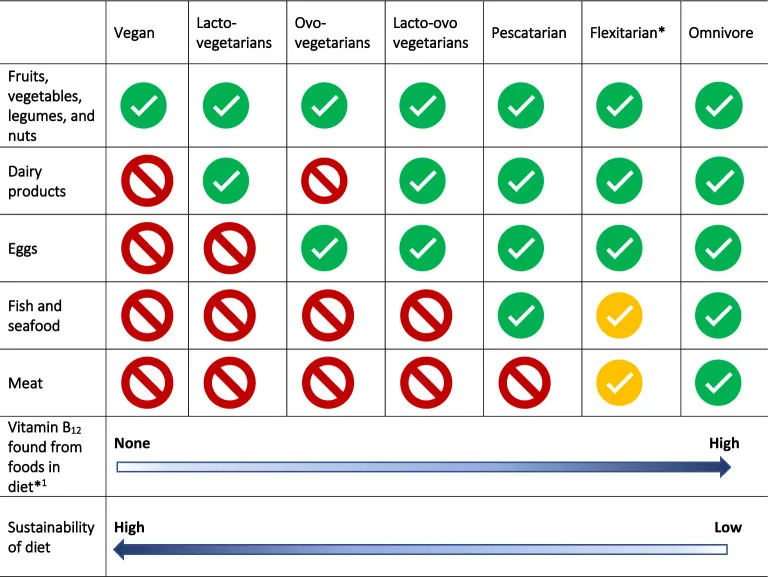Have you recently switched to a plant-based diet? If not, somebody you know probably has: the number of vegetarians and vegans is rapidly increasing, with an estimated 7 per cent of people in the UK and 5 per cent in the US now going meat-free. But for this ever-growing group, there is a double-edged sword to grapple with – a diet that is kind to the planet, but equally one that is less kind to your immune system.
No, it’s not an issue of protein, but vitamin B12 – 1 in 5 vegan and vegetarian diets are naturally lacking in the micronutrient. Deficiency rates only increase with age and it is even higher for those who have transitioned from a vegetarian to vegan diet where rates of vitamin B12 are already low.
And that's a big problem. Also known as cobalamin, B12 is a key vitamin in blood cell formation, cell metabolism, nerve function and the production of DNA. It is needed by every cell in your body in other words. An unsung hero, life without the micronutrient can have dire and lifelong, irreversible neurological effects.
While supplements and certain foods can help fix the problem, an unregulated market and lack of clear research make the situation somewhat cloudy. So what's the best solution? Here's what the science says...
The high risks of vitamin B12 deficiency
The problem is that Vitamin B12 specifically is only found in animal-based products. That includes fish, meat, poultry, eggs, milk and other dairy products. Beef and fish in particular have high numbers of B12, as does lamb liver (which contains over 3,000 per cent of your RDA).
Animals often get it from eating bacteria-laden manure and unsanitary water sources, synthesising them and then absorbing B12. Humans can't absorb B12 from bacteria (and we don't recommend you try).
But even if you are eating meat, it can be easy to not get enough. For instance, the vitamin can only be found in low numbers in chicken breasts and most pork – you'd need to eat 24 slices of bacon a day to reach the 2.4mcg (0.0000024 grams) of vitamin B12 recommended a day. And while B12 is found in dairy products, it is much less concentrated, only offering trace amounts of the vitamin.
There is some evidence that certain mushrooms, algae and similar food sources can contain vitamin B12. However, researchers point out that it is simply not reliable enough as a single source. Of the plant-based foods that could be used for vitamin B12, nori (seaweed) is the most suitable.

In short, if you're not eating meat (or the right kind of meat), it can be easy to miss your daily B12 target. And a body lacking in this key vitamin is at risk of folate-deficiency anaemia. This is a condition caused specifically by vitamin B12 deficiency in which the body does not have enough healthy red blood cells and can’t properly provide oxygen to body tissues.
Research varies on the rates of people suffering from B12 deficiency – scientists can’t agree on what truly counts as a deficiency. Because of this, the prevalence in vegans ranges from 5 to 52 per cent, while vegetarians sit between 6 and 14 per cent.
Symptoms include rapid breathing and shortness of breath, headaches, indigestion, loss of appetite, vision problems, diarrhoea, incontinence, mild depression and anxiety, and memory problems.
But that's not the most worrying part. “When you develop this clinical deficiency, the system which allows the body to absorb B12 and internalise it is effectively knocked out,” says Dr Kourosh Ahmadi, a reader in precision nutrition and expert on vitamin B12 from the University of Surrey.
“When that happens, an individual won’t benefit from supplements or food because they lack the mechanism to internalise the vitamin. The only solution is to inject vast amounts of vitamin B12 straight into the muscles.”
Read more:
- The great multivitamin myth: Why the pills could be harming your immune system
- Food supplements: Should we all be taking vitamin D?
Depending on how long it has taken to get a diagnosis and begin therapy, some of these symptoms, particularly the neurological ones, can’t be reversed. At this stage, no number of injections can adequately respond to it.
“There is an 8-12 week window after symptoms appear of giving every other day injections to get someone’s physiological symptoms back to a functioning level. Once you pass that, there is good evidence to suggest that symptoms similar to long COVID will become entrenched with no cure,” says Ahmadi.
There are even greater concerns for someone going through pregnancy. Lack of vitamin B12 can increase the risk of a baby developing a birth defect known as a neural tube defect. This is when the neural tube (a small channel that eventually becomes the brain and spinal cord) doesn't close, leaving it vulnerable to damage from amniotic fluid.
Currently, there are no UK guidelines regarding the treatment of Vitamin B12 deficiency during pregnancy and no specific dosing recommendations as of yet. However, pregnant women are told to try and get roughly the same amount of Vitamin B12 as required for all adults.
undefined
How can plant-based diets get vitamin B12?
So if there is a crucial vitamin that is only found in animals, what should vegetarians and vegans do? Start eating meat again?
“Unfortunately, there is little to no research in this area right now, but the current advice for vegan diets is that you should be taking daily vitamin B12 supplements. The important part here is to find the right type,” says Ahmadi.
“Ninety per cent of Vitamin B12 is produced in China, which has made it very expensive to manufacture since COVID. The problem is that it is only expensive if it is produced correctly. There are loads of Vitamin B12 supplements on the market, ranging from the incredibly cheap up to the vegan-friendly options which are usually pretty expensive.”
To make vegan-friendly supplements, the bacteria animals eat are cultivated in large tanks to mimic their natural environment. Once the bacteria creates vitamin B12, it is separated from the culture and purified.
So how do you find good supplements? The current advice is to look for GMP (Good Manufacturing Practice) labels – a standard backed by the United Nations. These are likely to be slightly more expensive but they have been guaranteed in their effectiveness.
Along with regular use of effective Vitamin B12 tablets, anyone on a plant-based diet is also recommended to utilise fortified foods. These are products where manufacturers have added additional micronutrients into their products during production. This includes a variety of alternative milks, yoghurts, drinks and even cereals. However, while these will contain Vitamin B12, it is likely only in trace amounts.
“Research has shown that a lot of these foods in the supermarket are not adequately fortified; they might even have sub-standard B12 in them. Some of these products can be really expensive and often not as healthy as they are marketed to be,” says Ahmadi.
For plant-based diets, vitamin B12 consumption comes down to these two factors. GMP-approved supplements, and properly fortified foods. For vegetarians, milk, eggs and other dairy products are also contributing small amounts of B12 to their diets.
While the risks of deficiency are scary, it is highly avoidable, even for those who begin to show symptoms.
“If it is caught in that window (8-12 weeks from symptoms starting) and an individual is diagnosed and managed, they will most often return to a level that is functioning as they were before,” says Ahmadi.
Read more:
- Behind the bold mission to upload every immune system in the world - including yours
- Vegan fast-food: why plant-based alternatives are good for the planet but not your health
About our expert, Kourosh Ahmadi
Ahmadi is a leading national and international researcher of precision nutrition and an expert in vitamin B12 and the risk of its deficiency.
